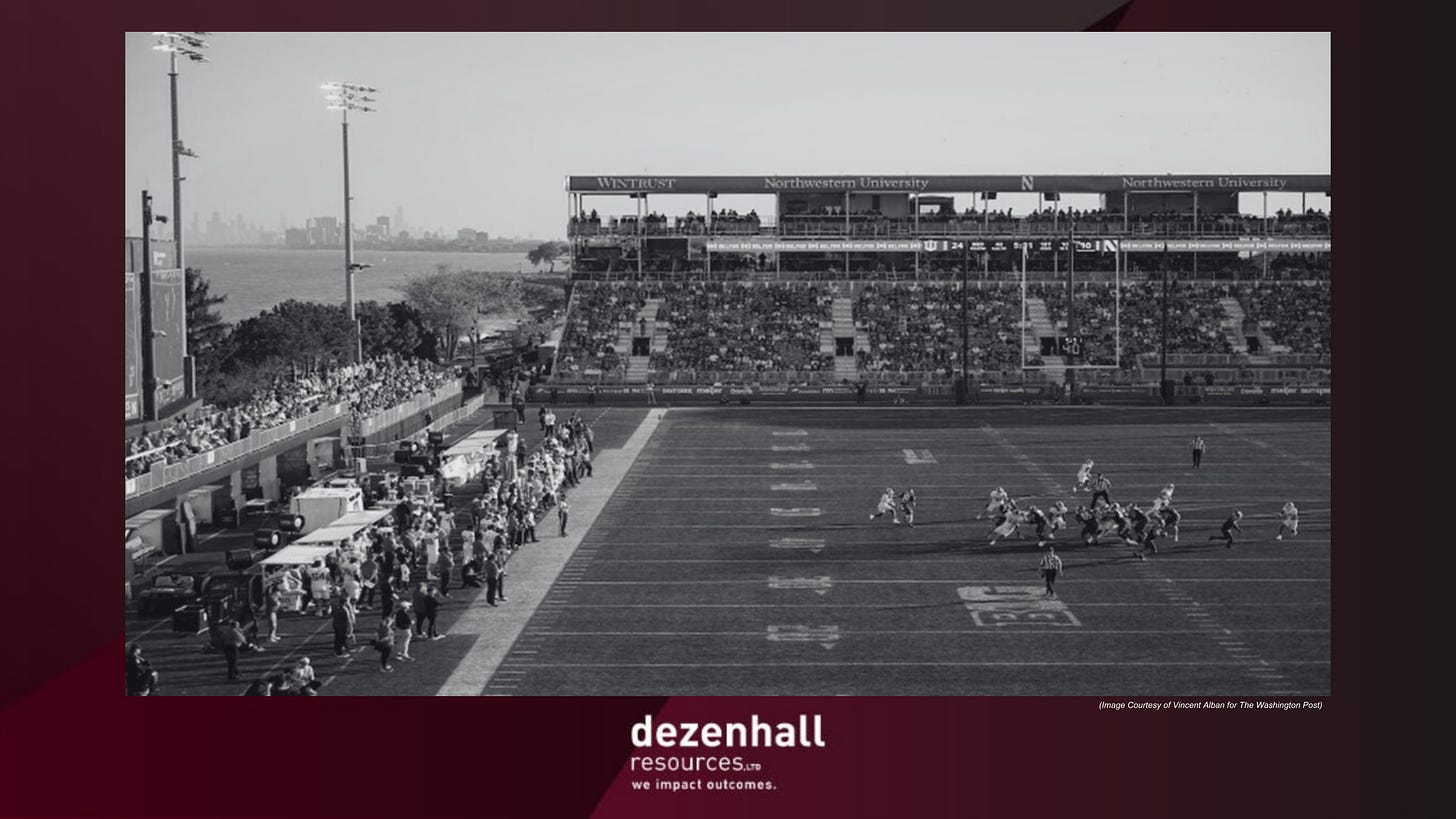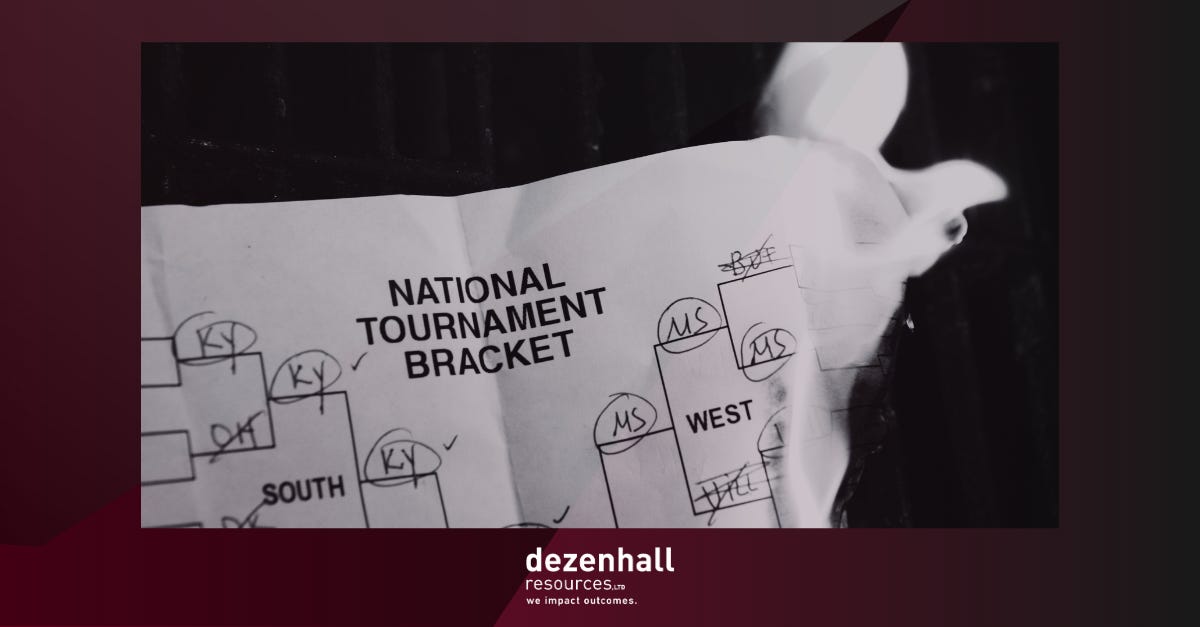Dez Reads. Northwestern’s Masterpiece, Amtrak’s Hotel on Wheels, AI Ethics, The Sphere That Stole the Show, and TikTok Under Fire.
This week’s Dez Reads is awesome. I loved reading and editing every submission. It is not lost on me that none of this week’s content is authored by yours truly.
I’d like to use this space to shout out Dezenhall legend Steven Schlein. This guy has been around longer than any of us, with titles including SVP, COO, and CEO. Now, he has earned a title with no acronym: “Of Counsel.” Steven spends half his time on offroad trails and skeet shooting, and the other half is counseling our team and our clients through high-stakes strategic work, drawing on decades of experience in reputational combat. A guy who got his start working on the docks at Port Newark and navigated the halls of Congress working for a Blue Dog Democrat (when those still existed) before spending multiple decades at Dez has a lot of insight to share.
We lead this week with Schlein’s take on Northwestern’s temporary football stadium; both the stadium and his take are fantastic. Beyond that, Mike Bova looks at Amtrak’s new marketing strategy, Anne Marie Malecha changes her mind regarding the Las Vegas Sphere, and Annie Moore provides a twofer: one submission on the ethical considerations of using AI in campaign ads and another evaluating a dozen attorneys general suing TikTok for addicting teens.
Fantastic, thought-provoking stuff from the team this week. I hope you enjoy this edition as much as I did.
Here we go.

Sports.
WaPo. Northwestern’s new football stadium is a wonder. It’ll be gone in two years.
The Northwestern Wildcats are playing in a 12,000-seat venue steps from Lake Michigan as their future stadium is built. The temporary home is a destination in itself.
This is a great story. Needing a temporary stadium while they build a new modern stadium, Northwestern converted some empty space between a field hockey field and Lake Michigan. They accidentally created a masterpiece of sports architecture. This field is within walking distance of all the dorms; has more premium seats than most stadiums; and gets a nice view and breeze from Lake Michigan.
A few takeaways:
- This is a wealthy country. A university had the money to build a temporary stadium rather than “borrow” another stadium because they didn’t want to inconvenience their students.
- Stadiums with charm and premium locations are better than modern stadiums built 40 miles downtown (I’m looking at YOU: Levi’s Stadium, home of the 49ers.)
They should NEVER tear this down. It should be the picture on the banner of their webpage, the picture on all their promotional materials, and the highlight of our high school senior visits.
– Steven Schlein
Business.
WSJ. Amtrak’s New Marketing Strategy: It’s Not a Train, It’s a Hotel on Wheels
Hot off a massive $22 billion cash infusion from the 2021 infrastructure bill, Amtrak is trying to lure in new riders with a different marketing approach – positioning themselves as a hotel on wheels.
Awareness of the Amtrak brand is high—83 percent of the population have heard of it—but the percentage of those who say they’re considering becoming customers is far lower at 23 percent, according to data-intelligence firm Morning Consult. This is likely driven by the fact that the travel time compared to airlines is much longer, so most may not consider it viable. The brand recognition is there, but they may run into an operational problem that their marketing and communications solutions cannot fix.
Amtrak passenger levels continue to steadily rise, and they are on track to service a record number of riders in 2024. But their issue might be capacity; the sleeper cars that they are advertising are sold out in advance, and many believe traveling by train to be painfully slow and unreliable, as delays and cancellations are all too frequent for it to be considered a reliable transportation option.
As someone who relied on Amtrak’s Acela corridor during a long-distance relationship, I can appreciate the value of convenience, speed and comfort. However, what will truly drive more customers onboard won’t be a fun marketing campaign but instead tangible improvements in service reliability and infrastructure. After all, even the best hotel on wheels needs to get you to your destination on time.
– Mike Bova
Politics.
Politico. An Indiana senator faked an ad. Now what?
As both a Hoosier and a digital operative, the recent controversy surrounding Sen. Mike Braun’s digitally altered campaign ad is concerning on multiple levels. At its core, this incident reflects the evolving and increasingly murky role of technology in political campaigns. In Indiana, where your average voter values integrity and transparency but may not necessarily be an expert in recognizing AI-generated content, the use of AI or other digital techniques to manipulate images without clear disclosure crosses a major ethical line.
While the Braun campaign may be the first to comply with Indiana’s new deepfake law after the fact, the ad still raises important questions about trust and truth in political messaging. Voters expect authenticity, and the use of altered images, especially in an election where trust is so crucial, can only erode that relationship. The law itself is critical but also imperfect, as it struggles to keep pace with rapidly advancing AI technology.
In a world where digital trickery is becoming more accessible, candidates must ensure that their ads don’t just meet legal standards but also the higher ethical standard that Hoosiers expect. Moving forward, Indiana’s political landscape needs greater clarity and enforcement around the use of these technologies to preserve the integrity of our democratic process.
– Annie Moore
Entertainment.
Architectural Digest. Why Las Vegas’s Sphere is the Gimmick That Worked
My favorite field trip in elementary school was to the planetarium. Sitting in the dark, round dome engulfed by the night’s sky felt otherworldly and transformative. Apparently, the Las Vegas Sphere has managed to capture that magic and engulf concertgoers with a full sensory experience.
As I started reading Livia Caligor’s review, I was skeptical. I do not share her love of Las Vegas; in fact, it’s one of my least favorite places on earth – stale air, no real sense of time, psychedelic carpet, etc. However, I absolutely love live music, and the thought of combining the power of a live rock show with planetarium-style beauty and imagery all around you is pretty intriguing.
Concertgoers – seeing U2, Dead & Company, the Eagles, and Phish – report the 17,000-plus seat Sphere offers a more intimate fan experience, and there really isn’t a bad seat in the house. Who would have thought that a $2.3 billion venue is ‘democratizing the concert experience’ by giving all fans, no matter their ticket price, a preeminent user experience fueled by 580,000 square feet of LED lights that display 1 billion colors at once, while 160,000 speakers pump out the purest sound.
Caligor concludes: “The visual, sonic, and spatial cacophony challenged and completely transformed my preconceived notion of the ability of a space to bring music to life.” I’m sold.
– Anne Marie Malecha
Technology.
Law360. AGs Slam TikTok with Youth Addiction, Fraud Claims
TikTok’s algorithm, optimized for engagement, thrives on Gen Z’s media habits: short, dopamine-triggering content delivered in an infinite scroll format. While this drives platform growth and revenue, it also preys on the psychological vulnerabilities of young users, encouraging compulsive behavior that can detrimentally impact mental health, as alleged in recent lawsuits from 12 states’ attorneys general.
It’s not just Gen Z and young people, though. With shorter attention spans across age demographics, we have all been conditioned to engage with platforms that deliver instant gratification and constant stimulation. TikTok’s algorithm is built to exploit these desires by personalizing content to keep users hooked. However, this strategy, while profitable, is ethically questionable, especially when it comes to underage users who don’t have fully developed brains yet. The claims that TikTok’s safety measures are easily bypassed only underscore the need for stricter regulations in designing platforms targeting young people.
The lawsuits represent a critical moment for the intersection of tech design and social responsibility. If platforms like TikTok don’t shift toward more transparent, ethically conscious practices, we may see stricter legal interventions shaping the future of digital media. I’m personally quite curious to see how each state handles these lawsuits and what the range of crackdowns and regulations could look like.
– Annie Moore


